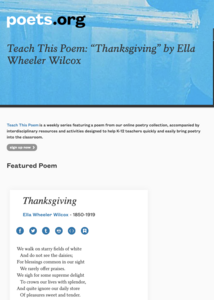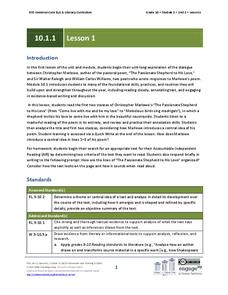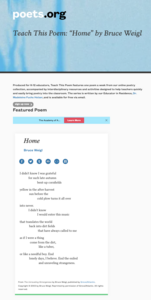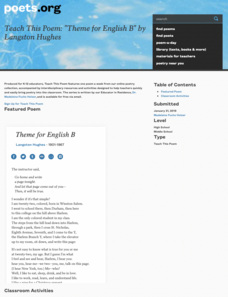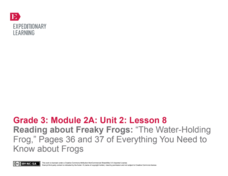Academy of American Poets
Teach This Poem: "Maps" by Yesenia Montilla
After examining a physical map of the world, learners conduct a close reading of Yesenia Montilla's poem "Maps." They note the interesting words and phrases, the way the poem is structured, and list questions they might have. After...
Academy of American Poets
Teach This Poem: "Wonder and Joy" by Robinson Jeffers
A study of Robinson Jeffers' poem "Wonder and Joy" reminds readers to notice and rekindle the appreciation of the many wondrous aspects of life. After a close reading of the poem, scholars use the provided questions to discuss the poem.
Academy of American Poets
Teach This Poem: “Thanksgiving” by Ella Wheeler Wilcox
Victor Laredo's painting "On the Beach" and Ella Wheeler Wilcox's poem "Thanksgiving" allow young scholars to use their noticing skills. Class members identify elements of the painting the artist uses to create the feeling of...
Santa Ana Unified School District
Getting to the Core: Early American Poets
How do poets convey emotion and represent their views of life? Pupils learn more about Whitman and Dickinson through the unit and analyze their bold reinvention of craft and style for poets to come. Looking at classic pieces such as...
Poetry4kids
Onomatopoeia Poetry Lesson Plan
Two exercises boost scholars' knowledge of a onomatopoeia with excerpts from famous poems. In exercise one, participants circle onomatopoeia words. Exercise two challenges writers to choose three words to use in an...
EngageNY
Poetry Analysis: Small Group Practice
Howdy partner! After discussion and teacher model reading of Slaveships, scholars pair up for a partner reading of the poem. They then use equity sticks to discuss their thoughts of the poem with the class. Readers talk about allusion,...
Academy of American Poets
Women in Poetry
Imagine linking poetry to technology! Thirty-three lessons comprise a 6-week "Women in Poetry" unit for high schoolers. Class members research women poets, learn how to respond electronically to discussions, write their poems, create web...
EngageNY
Developing Reading Fluency: Selecting a Text and Practicing Reading Aloud
Young readers continue to strengthen their fluency skills with a text of their choosing. The teacher first engages the class with an audio recording or read-aloud of a short poem, modeling for children how to read fluently. Next it's...
EngageNY
Grade 10 ELA Module 1: Unit 1, Lesson 1
Can authors speak to each other across works, genres, and centuries? Study the conversation between Christopher Marlowe in his poem "The Passionate Shepherd to His Love" and the responses by Sir Walter Raleigh and William Carlos Williams...
ReadWriteThink
What is Poetry? Contrasting Poetry and Prose
Introduce middle schoolers to the different strategies used when reading prose versus poetry. Groups use a Venn diagram and a poetry analysis handout to compare the characteristics of an informational text and a poem on the same...
Academy of American Poets
Teach This Poem: “Dead Stars” by Ada Limón
Pay attention! A lesson plan featuring Ada Limon's poem "Dead Stars" is designed to help learners develop their noticing skills. Class members first study the constellation Orion's image and list what they notice and how the image makes...
Academy of American Poets
Teach This Poem: “Home” by Bruce Weigl
A poetry lesson takes a close look at home. Scholars discuss with partners what they are most grateful for at their homes. A timelapse video showcases potato tubers growing. While watching, pupils write down what they notice. Learners...
Academy of American Poets
Teach This Poem: "On Being Brought from Africa to America" by Phillis Wheatley
Phillis Wheatley's poem, "On Being Brought from Africa to America" is the focus of a lesson that asks readers to consider how the poem is a critique of slavery. Groups comprise a list of words and phrases they notice as well as questions...
Academy of American Poets
Teach This Poem: "Theme for English B" by Langston Hughes
Langston Hughes' "Theme for English B" is featured in a lesson that asks pupils to first read a biography of Hughes and list things about his life they think are important. The class then reads the poem and compares what they learned...
Texas Education Agency (TEA)
Paradox (English III Reading)
Pairs of contradictory words introduce learners to paradoxes, the literary device writers use to get readers thinking deeply about their messages. An interactive lesson uses poems by Emily Dickinson and Wilfred Owen and excerpts from the...
Curated OER
Sonnet Explication
Students analyze close readings of poems, looking up words in the dictionary, and discussing the major parts of dictionary definitions, including word origin and parts of speech. They examine sonnets, then compare/contrast their findings.
National Endowment for the Humanities
“Every Day We Get More Illegal” by Juan Felipe Herrera
A study of Jan Felipe Herrera's poem "Every Day We Get More Illegal" opens the door for a discussion on immigration. To begin, class members examine the photograph "Desert Survival," record their observations of the image, and then...
Curated OER
Express Yourself Lesson Seed 9: Climax
Conduct a close reading of chapter 9 of The Cay. Read the chapter again and ask pupils to respond to a list of included text-dependent questions. Finish the class with the provided writing assignment, which asks learners to use textual...
National Endowment for the Humanities
Practical Criticism
As an introduction to literary criticism, class members recreate I.A. Richards' close reading experiment. Individuals select a poem, paraphrase the story, focus on the imagery used, consider what the imagery adds to the tale, and...
EngageNY
Looking Closely at Stanza 1—Identifying Rules to Live By Communicated in “If”
Here is a lesson plan in which pupils connect themes and rules to live by from the story Bud, Not Buddy by Christopher Paul Curtis to those found in the poem If by Rudyard Kipling. First, scholars discuss their reading and review Bud's...
EngageNY
Looking Closely at Stanza 3—Identifying Rules to Live By Communicated in “If”
Just as Bud, from the novel Bud, Not Buddy by Christopher Paul Curtis, had rules to live by, so does the poem, If by Rudyard Kipling, but how do the two relate? Pupils delve deep into the poem's third stanza, participate in a grand...
K20 LEARN
You Think You Have Problems: Perspective in Multi-Genre Literature
Young scholars are asked to reflect on how personal experiences might influence points of view and perspectives. They read poems and biographies of the poets and then match the poem to the poet. To justify their matches, learners...
EngageNY
Reading about Freaky Frogs: “The Water-Holding Frog"
Boost reading comprehension skills with a lesson all about freaky frogs. A poem hooks scholars and takes them into a reading of an informational text followed by peer discussions. A three-page worksheet focuses on text features and...
Academy of American Poets
Teach This Poem: "Toward the Winter Solstice" by Timothy Steele
Timothy Steele's poem, "Toward the Winter Solstice," offers scholars an opportunity to consider what poets and scientists could learn from each other's work. First, learners examine a NASA image of a star-forming region in the Orion...




